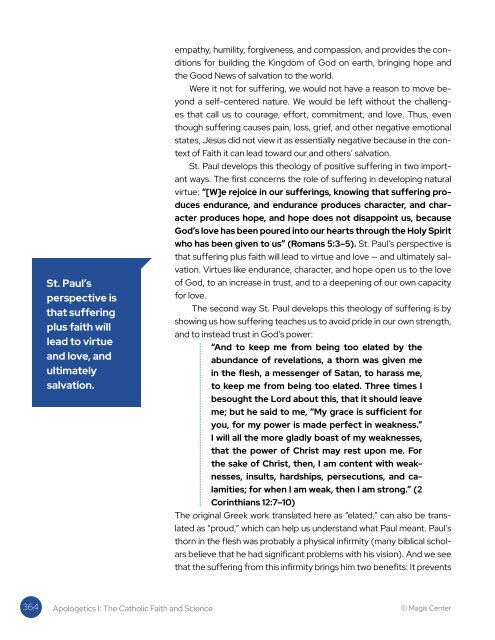CFS-WB-CH18
Create successful ePaper yourself
Turn your PDF publications into a flip-book with our unique Google optimized e-Paper software.
St. Paul’s<br />
perspective is<br />
that suffering<br />
plus faith will<br />
lead to virtue<br />
and love, and<br />
ultimately<br />
salvation.<br />
empathy, humility, forgiveness, and compassion, and provides the conditions<br />
for building the Kingdom of God on earth, bringing hope and<br />
the Good News of salvation to the world.<br />
Were it not for suffering, we would not have a reason to move beyond<br />
a self-centered nature. We would be left without the challenges<br />
that call us to courage, effort, commitment, and love. Thus, even<br />
though suffering causes pain, loss, grief, and other negative emotional<br />
states, Jesus did not view it as essentially negative because in the context<br />
of Faith it can lead toward our and others’ salvation.<br />
St. Paul develops this theology of positive suffering in two important<br />
ways. The first concerns the role of suffering in developing natural<br />
virtue: “[W]e rejoice in our sufferings, knowing that suffering produces<br />
endurance, and endurance produces character, and character<br />
produces hope, and hope does not disappoint us, because<br />
God’s love has been poured into our hearts through the Holy Spirit<br />
who has been given to us” (Romans 5:3–5). St. Paul’s perspective is<br />
that suffering plus faith will lead to virtue and love — and ultimately salvation.<br />
Virtues like endurance, character, and hope open us to the love<br />
of God, to an increase in trust, and to a deepening of our own capacity<br />
for love.<br />
The second way St. Paul develops this theology of suffering is by<br />
showing us how suffering teaches us to avoid pride in our own strength,<br />
and to instead trust in God’s power:<br />
“And to keep me from being too elated by the<br />
abundance of revelations, a thorn was given me<br />
in the flesh, a messenger of Satan, to harass me,<br />
to keep me from being too elated. Three times I<br />
besought the Lord about this, that it should leave<br />
me; but he said to me, “My grace is sufficient for<br />
you, for my power is made perfect in weakness.”<br />
I will all the more gladly boast of my weaknesses,<br />
that the power of Christ may rest upon me. For<br />
the sake of Christ, then, I am content with weaknesses,<br />
insults, hardships, persecutions, and calamities;<br />
for when I am weak, then I am strong.” (2<br />
Corinthians 12:7–10)<br />
The original Greek work translated here as “elated,” can also be translated<br />
as “proud,” which can help us understand what Paul meant. Paul’s<br />
thorn in the flesh was probably a physical infirmity (many biblical scholars<br />
believe that he had significant problems with his vision). And we see<br />
that the suffering from this infirmity brings him two benefits: It prevents<br />
364 Apologetics I: The Catholic Faith and Science<br />
© Magis Center


